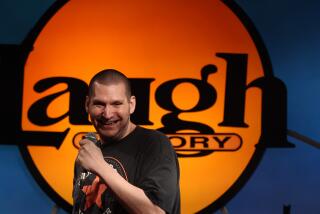Laughing for Letterman : How Dave’s Scouts Hit the Clubs Looking for ‘Late Show’ Comics
It’s pretty much been funny business as usual this week for David Letterman, with an L.A. twist. Having relocated to Television City for a week’s run, Dave was heard more than once saying “dude.” He and Michael Keaton took a dip in the temporary set’s shimmering pool. And Lakers great Kareem Abdul-Jabbar took the shape of a begoggled (and befuddled) Calvert De Forest.
It was definitely not business as usual Wednesday night at the Laugh Factory, when members of Letterman’s staff witnessed a showcase of 16 comics, all of whom were putting their best laughs forward at the Sunset Strip club in an attempt to win a stand-up slot on a future “Late Show.”
“You get used to all kinds of clubs and all kinds of auditions,” comedian Todd Glass said after performing, “but this was absolutely nerve-racking. You don’t want to change what you do too much, but I definitely tried to use the bits that I thought Dave would enjoy the most.”
*
Though neither Letterman nor “Late Show” executive producer Robert Morton was present at the showcase, segment producer Daniel Kellison, the show’s chief comedy scout, served as their eyes and ears for the night. From a perch in the club’s balcony, he followed each comic’s allotted seven-minute set intently, keeping joke-by-joke notes on a legal pad.
“I think there are a lot of smart comics out there,” Kellison explained, “and that’s basically what we’re looking for--people with a unique sense of humor that work above the belt. One of my principal concerns is to stay true to Dave’s sensibility and the sensibility of the show. The comics have to reflect that.”
The comics at this showcase represented a range of styles, material and experience. The evening moved along quickly, with the packed room responding equally well to the brash observations of Blake Clark, the crafty wit of Larry Miller and the wilder antics of Eddie Griffin. Chris Rock of “Saturday Night Live” fame scored big laughs, along with several lesser-known performers.
The “Late Show” staffers were not just watching the fun with a cool professional eye--they laughed it up as much as anyone else.
Peter Fogel got a roar when he said, “I got stopped for driving alone in a car-pool lane. I told the cop that I have no friends and my family doesn’t like me. I think that should be a valid excuse.”
Reggie McFadden had a hit with his descriptions of his asthmatic father trying to listen in on his teen phone conversations.
Young comic Harland Williams broke them up when he talked about finding out what he was worth by running his head over a checkout scanner: “Apparently I’m worth half a dozen eggs.”
Kellison’s laughter isn’t enough to guarantee a comic a “Late Show” appearance: “There are plenty of times when I may find certain comics very funny,” he says, “but I also know that there’s no way they’re going to be right for the show.” That’s because one of his challenges is to find comics whose material will entertain Letterman’s broader 11:30 p.m. audience, said Kellison, who worked on the old NBC show.
“We’re definitely trying to appeal to a wider audience, and we’re taking into account that not everyone’s going to appreciate some of the old show’s humor. Our hope is that the music, guests and comedy will be more accessible. The most important thing for the comedy is that it’s sharp, clever and clean.”
Comics aren’t instantly selected or rejected on the strength of one showcase. If Kellison sees potential, he’ll work with a comic over a period of time to get a perfectly tailored “Late Show” set put together. Morton and Letterman then make the final decisions on who gets booked.
One stand-up vet trying to make the cut at the Laugh Factory was notoriously off-color comic Robert Schimmel. “This is the first time I ever tried out for Dave’s show, and I decided to work clean just to see if I could do it. It felt great. I could kill club crowds doing blue material 365 nights a year, but more people would see me on Letterman in one night. That’s worth being clean for seven minutes.”
One of Schimmel’s bits included the fine points of fending off a shark attack: “They say you’re supposed to punch him in the nose, and if that doesn’t work, poke him in the eye. What if he was just swimming by? He says, ‘Ow! Why’d you hit me? Look, I wasn’t going to eat you, but now I have to. The other sharks are watching and it doesn’t look good.’ ”
Club owner Jamie Masada said the high-stakes showcase brought a decidedly different mood to the club. “The comics had tremendous energy on-stage and tremendous nervousness off-stage. Usually there’s a lot of kidding around, but tonight was total concentration. I was a nervous wreck myself, hoping that everything went well. It was an exciting night.”
Harland Williams said he somehow managed to keep his cool. “I felt like an underdog, and I guess that helped me stay relaxed. I played to the audience rather than to ‘The Letterman People.’ I just did what I do and managed not to turn into a puddle of gravy.”
Kellison and other “Late Show” staffers liked a lot of what they saw at the Laugh Factory, and at a similar showcase last Sunday at the Improv.
“This has been a crazy week, but it’s been fruitful,” Kellison said. “I saw 25 or 30 comics, a lot of whom I’ve been watching for a while, and several are definitely ready for the show.”
Some comics weren’t taking any chances. As Todd Glass finished his strong, fast-paced set, he squinted up at the balcony. “Watch for me on the Letterman show?” he asked with a hopeful grin.
More to Read
The complete guide to home viewing
Get Screen Gab for everything about the TV shows and streaming movies everyone’s talking about.
You may occasionally receive promotional content from the Los Angeles Times.






